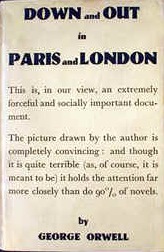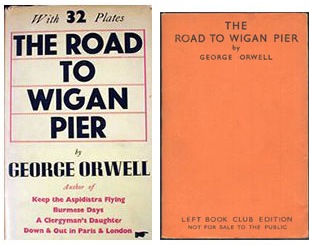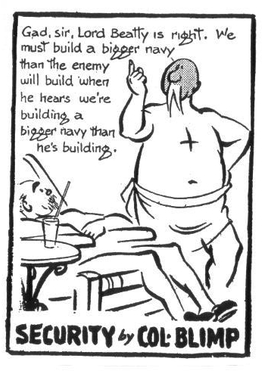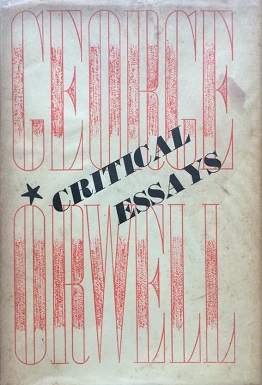
Eric Arthur Blair was a British novelist, poet, essayist, journalist, and critic who wrote under the pen name of George Orwell, a name inspired by his favourite place, the River Orwell. His work is characterised by lucid prose, social criticism, opposition to all totalitarianism, and support of democratic socialism.

Down and Out in Paris and London is the first full-length work by the English author George Orwell, published in 1933. It is a memoir in two parts on the theme of poverty in the two cities. Its target audience was the middle- and upper-class members of society—those who were more likely to be well educated—and it exposes the poverty existing in two prosperous cities: Paris and London. The first part is an account of living in near-extreme poverty and destitution in Paris and the experience of casual labour in restaurant kitchens. The second part is a travelogue of life on the road in and around London from the tramp's perspective, with descriptions of the types of hostel accommodation available and some of the characters to be found living on the margins.

Homage to Catalonia is a 1938 memoir by English writer George Orwell, in which he accounts his personal experiences and observations while fighting in the Spanish Civil War.

The Road to Wigan Pier is a book by the English writer George Orwell, first published in 1937. The first half of this work documents his sociological investigations of the bleak living conditions among the working class in Lancashire and Yorkshire in the industrial north of England before World War II. The second half is a long essay on his middle-class upbringing, and the development of his political conscience, questioning British attitudes towards socialism. Orwell states plainly that he himself is in favour of socialism, but feels it necessary to point out reasons why many people who would benefit from socialism, and should logically support it, are in practice likely to be strong opponents.

John Dickson Carr was an American author of detective stories, who also published using the pseudonyms Carter Dickson, Carr Dickson, and Roger Fairbairn.

Colonel Blimp is a British cartoon character by cartoonist David Low, first drawn for Lord Beaverbrook's London Evening Standard in April 1934. Blimp is pompous, irascible, jingoistic, and stereotypically British, identifiable by his walrus moustache and the interjection "Gad, Sir!"

"Politics and the English Language" (1946) is an essay by George Orwell that criticised the "ugly and inaccurate" written English of his time and examined the connection between political orthodoxies and the debasement of language.

Sir Bernard Henry Spilsbury was an English pathologist. His cases include Hawley Crippen, the Seddon case, the Major Armstrong poisoning, the "Brides in the Bath" murders by George Joseph Smith, the Crumbles murders, the Podmore case, the Sidney Harry Fox matricide, the Vera Page case, and the murder trials of Louis Voisin, Jean-Pierre Vaquier, Norman Thorne, Donald Merrett, Alfred Rouse, Elvira Barney, Toni Mancini, and Gordon Cummins. Spilsbury's courtroom appearances became legendary for his demeanour of effortless dominance.

Hawley Harvey Crippen, colloquially known as Dr. Crippen, was an American homeopath, ear and eye specialist and medicine dispenser who was hanged in Pentonville Prison, London, for the murder of his wife, Cora Henrietta Crippen. He was the first criminal to be captured with the aid of wireless telegraphy.
The cleft chin murder was a killing which occurred as part of a string of crimes during 1944, and was mentioned in George Orwell's essay "Decline of the English Murder". It became known as the "cleft chin murder" because the murder victim, George Edward Heath, a taxi driver, had a cleft chin.
"Such, Such Were the Joys" is a long autobiographical essay by the English writer George Orwell.
"England Your England" is an essay written by the English author George Orwell during The Blitz of 1941 as bombers of Nazi Germany flew overhead. It was his attempt to define English culture and the English people for the rest of the world as he feared that it might soon be wiped out by the Nazis. In the essay he also wrote that England would not change into a fascist state and could not unless she was thoroughly broken.
"The Lion and the Unicorn: Socialism and the English Genius" is an essay by George Orwell expressing his opinions on the situation in World War II-era Britain. The title alludes to the heraldic supporters appearing in the full royal coat of arms of the United Kingdom.
The "London Letters" were a series of fifteen articles written by George Orwell when invasion by Nazi Germany seemed imminent, and published in the American left-wing literary magazine Partisan Review. As well as these "London Letters", PR also published other articles by Orwell.
'Notes on Nationalism' is an essay completed in May 1945 by George Orwell and published in the first issue of the British magazine Polemic in October 1945. Political theorist Gregory Claeys has described it as a key source for understanding Orwell's novel Nineteen Eighty-Four.
"A Good Word for the Vicar of Bray" is an essay by the English author George Orwell. In it Orwell encourages the public-spirited action of planting trees, which may well make up for the harm people do in their lives. The essay was first published in Tribune on 26 April 1946.

The bibliography of George Orwell includes journalism, essays, novels, and non-fiction books written by the British writer Eric Blair (1903–1950), either under his own name or, more usually, under his pen name George Orwell. Orwell was a prolific writer on topics related to contemporary English society and literary criticism, who has been declared "perhaps the 20th century's best chronicler of English culture." His non-fiction cultural and political criticism constitutes the majority of his work, but Orwell also wrote in several genres of fictional literature.

Nineteen Eighty-Four is a dystopian novel and cautionary tale by English writer Eric Arthur Blair, who wrote under the pen name George Orwell. It was published on 8 June 1949 by Secker & Warburg as Orwell's ninth and final book completed in his lifetime. Thematically, it centres on the consequences of totalitarianism, mass surveillance, and repressive regimentation of people and behaviours within society. Orwell, a staunch believer in democratic socialism and member of the anti-Stalinist Left, modelled the Britain under authoritarian socialism in the novel on the Soviet Union in the era of Stalinism and on the very similar practices of both censorship and propaganda in Nazi Germany. More broadly, the novel examines the role of truth and facts within societies and the ways in which they can be manipulated.

Critical Essays (1946) is a collection of wartime pieces by George Orwell. It covers a variety of topics in English literature, and also includes some pioneering studies of popular culture. It was acclaimed by critics, and Orwell himself thought it one of his most important books.

"Reflections on Gandhi" is an essay by George Orwell, first published in 1949, which responds to Mahatma Gandhi's autobiography The Story of My Experiments with Truth. The essay, which appeared in the American magazine Partisan Review, discusses the autobiography and offers both praise and criticism to Gandhi, focusing in particular on the effectiveness of Gandhian nonviolence and the tension between Gandhi's spiritual worldview and his political activities. One of a number of essays written by Orwell and published between Animal Farm (1945) and Nineteen Eighty-Four (1949), "Reflections on Gandhi" was the last of Orwell's essays to be published in his lifetime and was not republished until after his death.










